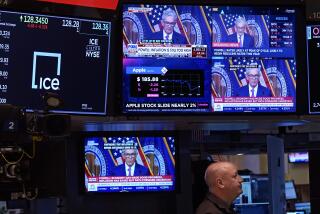Depleted Stock Funds See Inflows Resume
- Share via
More investors resumed buying stock mutual funds in recent weeks as the market rallied with the onset of the Iraq war, new data show.
The buying may have come in the nick of time for many portfolio managers: The average stock fund’s cash reserves sank last month to the lowest level since March 2000 -- when the long bull run was peaking.
With managers’ cash holdings so meager, “They’re desperate for a bull market” to lure in more money, said Steve Hochberg, chief market analyst at investment research firm Elliott Wave International in Gainesville, Ga.
The average stock fund had 4.3% of assets in cash as of the end of February, down from 4.5% in January and the lowest since 4.0% in March 2000, the Investment Company Institute, the fund industry’s main trade group, said Thursday.
The decline in cash reserves followed another month of money outflows from stock funds. Investors pulled a net $11.1 billion from the funds in February, the eighth monthly outflow in the last nine, according to the institute.
Net cash flows measure new stock fund purchases minus redemptions.
Often, stock funds build up cash during bear markets by selling some shares and keeping the proceeds in reserve. That then provides fuel to help power a new advance.
This time, fund cash levels rose modestly after the bear market began in 2000, but have edged down again in recent months.
The trend suggests that many portfolio managers have been optimistic about a market rebound -- and have chosen to stay heavily invested in shares -- while their investors have on balance been taking money out.
The February cash reserve tally also suggests a sustained stock rally could be more difficult because one traditional source of fuel isn’t there. When the market surged in 1991 at the start of the Persian Gulf War, by comparison, stock fund cash levels averaged 11.4% of assets.
Still, with $2.5 trillion in assets, stock mutual funds control only about one-fifth of the total U.S. equity market. Cash for a rally could come from other big market players, such as pension funds, analysts say.
Also, many mutual fund managers expected small investors to begin buying again if the market rallied with the start of the war. That appears to be happening, some fund companies and independent data-trackers say.
In the two weeks ended Wednesday stock funds had a net inflow of $3.6 billion, according to estimates by AMG Data Services of Arcata, Calif. Still, for March overall, AMG estimates the funds will see about $3.1 billion flow out.
Vanguard Group’s stock funds are on pace for a net inflow of $3 billion in March, after a “basically flat” February, spokesman Brian Mattes said. Fidelity Investments spokesman Vin Loporchio said the Boston fund giant also is seeing inflows to stock funds this month after a $1.5-billion outflow in February.
Many investors continue to favor bond mutual funds over stocks. In February bond funds had a net cash inflow of $19.6 billion, the second-highest inflow on record after July’s $28.1 billion, according to the institute.
Some financial advisors fear that small investors have been flocking to bond funds at the wrong time -- as government bond yields have been hitting generational lows.
“This might be like 1993, when so many small investors piled into bond funds only to get burned in 1994 when interest rates rose,” said analyst Lars Schuster of Financial Research Corp. in Boston. Rising market interest rates depress the principal value of older bonds.
But Schuster and other analysts said most of the recent bond-fund inflows haven’t gone to long-term Treasury funds, which are the most sensitive to rate changes, but to other types of government and corporate debt funds, including shorter-term funds that are less sensitive to rate swings.
More to Read
Inside the business of entertainment
The Wide Shot brings you news, analysis and insights on everything from streaming wars to production — and what it all means for the future.
You may occasionally receive promotional content from the Los Angeles Times.










